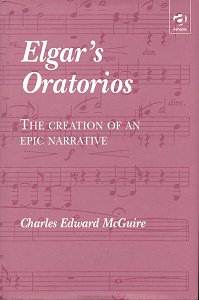Textually dense though it may occasionally seem,
and necessarily laden with the academic impedimenta of copious
footnotes (it began as a doctoral thesis), this is an important
contribution to the burgeoning area of Elgar Studies. It places
the four oratorios – The Light of Life, The Dream of Gerontius,
The Apostles and The Kingdom – in the historical continuum of
the British oratorio tradition, demonstrating these works’ independence
and novelty of musical and expressive power, and adducing (or
limiting or denying) a Wagnerian influence. McGuire also seeks
to explore the narrative voice inherent in Elgar’s oratorios and
to this end there are numerous musical examples and tables as
supporting evidence, such as sample programmes of the Birmingham
Festivals and a list of Narration in British Oratorios during
the years 1730-1944, dates that obviously fall outside the relevant
period but which stand for a comprehensiveness of view. The bibliography
is full, the data supportive of McGuire’s arguments.
There is inevitably a strong historical component
to the study, one that establishes Handelian precedent, the changing
nature of oratorio programmes and the rise of Mendelssohn. There
is also a digression on tonic sol fa and its use in British musical
education which is pertinent and demonstrates the gradual rise
in musical knowledge amongst choirs, though it does make for somewhat
discursive reading. He stresses the moral aspect inherent in musical
education of this kind as he does equally the nature of the oratorio
itself, which he takes some time to attempt to define. It’s inevitable
I suppose that he should feel it incumbent on him to do so but
definition of this kind is notoriously loose and since his study
is predicated on the idea that Gerontius is an oratorio it seems
unnecessary to labour the point.
As he notes, the apogee of the oratorio in the
British Isles were the years between 1880 and 1899, an imperial
sunset that saw a rise in musical education, increased leisure
opportunities, a proliferation of Music Festivals and offering
greater chances for first – and inevitably in many cases last
– performances. The years also witnessed a gradual but definable
shift in subject matter from the Old to the New Testament. What
set Elgar apart from the mass of oratorio production, he notes,
were depth of characterisation, psychological drama, scope and
use of musical material, the use of a narrator, leitmotif and
the use of "movements." It’s true that Elgar’s control
of span in the musical sense was prodigious but some may draw
other conclusions here and will certainly not agree to the concept
of Elgarian "movements" in the oratorio context. As
for the idea of Leitmotif, McGuire contrasts it with the use of
representative themes in The Light of Life, a work, incidentally,
he considers "traditional" and of which he himself has
a traditional opinion, considering it highly limited. Its lack
of cohesion, lack of real development – such as there is, is local
– the encumbrances of recitative, arias and choruses all point
toward what in McGuire’s terms is an old fashioned and flawed
work lacking the thread of narrative. The idea of narrative discourse
in the oratorio is the heart of McGuire’s argument; he sees its
absence as a sign of traditional practice, its presence as a sign
of modernity.
He focuses on the libretti as well, analysing
to good effect what Elgar didn’t set of Newman’s poem as much
as what he did. The analysis of literary narrative tends somewhat
to occlude the purely musical narrative – words, bearing the freight
and weight of meaning, tend to occupy time that could have been
spent on the purely musical aspects of the score. To advance the
narrative theory McGuire also produces as ancillary tables little
boxes within boxes, like Russian dolls, to emphasise his points.
At one point the heading Vivid description narration (two-level)
is subjected to a box within a box picture depicting two levels
that McGuire calls Audience watches/hears and, well it’s
too complicated. Suffice it to say that the obscurantism of some
of his arguments is an occasional problem.
When he reaches The Apostles and The Kingdom
and their greater sense of Wagnerian procedure his analysis of
the construction of the text – who says what, when and how – bears
greater fruit. Narration being a greater feature of the Apostles
he is able to focus precisely on the text employed and its perceived
meaning, though once more I think he loads his text with far too
much apparatus to come to swift and decisive judgement. He contrasts
for example the text of the Prologue of The Apostles with Isaiah
61: 1-3 and 11 line by line; he has a series of overlapping circles
like orbiting planets ostensibly to delineate Levels of Narrative
in The Apostles. These sort of things may well be the result
of perceived academic necessity but they’re not easy to come to
terms with. Still the analysis of The Kingdom, though still clogged
by the devices just mentioned, is impressive and it is intriguing
for once to consider how an audience actually perceives, or is
made to perceive, the narrative rather than merely absorb a performance.
For this and other reasons we have cause to admire
the resolute, sometimes dogged, work McGuire has carried out.
I think he succeeds best in his analysis of Elgar’s compositional
directions, his balancing of text and source material, investigation
of the effect a narrative has on the listener, and the broad advance
of Elgar’s mastery over form. And that is no small matter.
Jonathan Woolf

![]() Ashgate 2002 339pp Ł52.50
Ashgate 2002 339pp Ł52.50